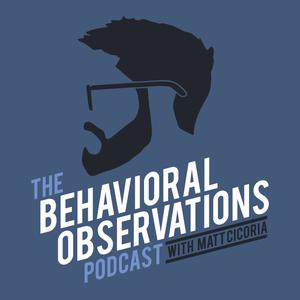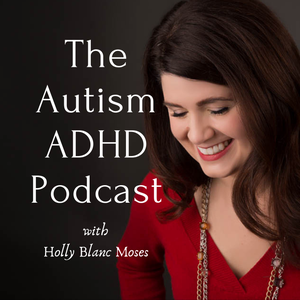
ABA Inside Track
Robert Parry-Cruwys
- 1 hour 14 minutesEpisode 300 - Vaccines Do Not Cause Autism
Can you believe we made it all the way to episode 300? Well, we decided to cap off the event by revisiting a topic that was in the headlines way back when the three of us started in the field of behavior analysis…and sadly is STILL a topic of discussion: Vaccines and autism. And while the findings are in the title (they don’t), we review the research as to why there is still any discussion on the matter and reflect on whether approaching the anti-vaccine debate from a purely scientific findings lens might be playing into an ableist narrative that paradoxically feeds the misinformation discourse.
Thanks to everyone for supporting our show for all these years (and special thanks to everyone who joined us at our live recording!).
This episode is available for 1.0 LEARNING CEU.
Articles discussed this episode:
Ahearn, W.H. (2010). What every behavior analyst should know about the “MMR causes autism” hypothesis. Behavior Analysis in Practice, 3, 46-52. doi: 10.1007/BF03391757
Deer, B. (2011). How the case against the MMR vaccine was fixed. The BMJ, 342:c5347. doi: 10.1136/bmj.c5347
Taylor, L.E., Swerdfeger, A.L., & Eslick, G.D. (2014). Vaccines are not associated with autism: An evidence-based meta-analysis of case-control and cohort studies. Vaccine, 32, 3623-2629. doi: 10.1016/j.vaccine.2014.04.085
Alvik-Harju, C. (2024). Finding more constructive ways forward in the debate over vaccines with increased disability cultural competence. Med Humanit, 49, 9-16. doi: 10.1136/medhum-2021-012342
If you're interested in ordering CEs for listening to this episode, click here to go to the store page. You'll need to enter your name, BCBA #, and the two episode secret code words to complete the purchase. Email us at [email protected] for further assistance.
29 January 2025, 5:15 am - 1 hour 10 minutesEpisode 299 - Collaborative Problem Solving
Despite living more solidly in the psychology domain, Collaborative Problem Solving (CPS) as a treatment for oppositional behaviors is increasingly moving into the mainstream. But does its attempts to change behavior patterns make it behavior analytic or something else? In this episode we look at a few of the earliest studies to evaluate the efficacy of CPS as well as some of the more recent publications on CPS as a treatment for challenging behavior and to discuss just what it is and whether you should be paying attention. But will we answer the key question: Is studying CPS an avenue of collaboration between behavior analysis and psychology or a watered-down version of older behavioral treatments?
This episode is available for 1.0 LEARNING CEU.
Articles discussed this episode:
Greene, R.W., Ablon, J.S., & Goring, J.C. (2003). A transactional model of oppositional behavior: Underpinnings of the Collaborative Problem Solving approach. Journal of Psychosomatic Research, 55, 67-75. doi: 10.1016/S0022-3999(02)00585-8
Pollastri, A.R., Wang, L., Eddy, C.J., & Ablon, J.S. (2023). An open trial of Collaborative Problem Solving in a naturalistic outpatient setting. Clinical Child Psychology and Psychiatry, 28, 512-524. doi: 10.1177/13591045221094387
Stoll, S.J., Hartman, J.D., Paxton, D., Wang, L., Ablon, J.S., Perry, B.D., & Pollastri, A.R. (2023). De-implemnting a point and level system in youth residential care without increased safety risk: A case study. Residential Treatment for Children and Youth. doi: 10.1080/0886571X.2023.2233408
If you're interested in ordering CEs for listening to this episode, click here to go to the store page. You'll need to enter your name, BCBA #, and the two episode secret code words to complete the purchase. Email us at [email protected] for further assistance.
22 January 2025, 5:15 am - 1 hour 3 minutesEpisode 298 - Auld Bag Syne (Winter 2025 Grab Bag)
VERSE
Should old research articles be forgot,
and never brought to ABA podcasts?
Should old research articles be forgot,
and auld bag syne?
CHORUS
For auld bag syne, my BCBAs,
for auld bag syne,
we’ll take a cup of dissemination yet,
for auld bag syne.
This episode is available for 1.0 LEARNING CEU.
Articles discussed this episode:
Graham, S., Keenan, M., & Dillenburger, K. (2024). All for one and one for all: The good inclusion game. Behavioral Interventions. doi: 10.1002/bin.2048
Migan-Gandonou Horr, J. & Campos, C. (2024). Effects of a technology‐based self‐management intervention on social media use in a college student. Behavior Analysis in Practice. doi: 10.1007/s40617-024-00977-3
Schmidt, J., Krantz, J., King, H., Vetter, J., & Maruska, C. (2024). Using a brief experimental analysis for writing speed intervention identification. Behavioral Interventions, 39. doi: 10.1002/bin.2019
If you're interested in ordering CEs for listening to this episode, click here to go to the store page. You'll need to enter your name, BCBA #, and the two episode secret code words to complete the purchase. Email us at [email protected] for further assistance.
15 January 2025, 5:15 am - 1 hour 16 minutesEpisode 297 - Matching Law
Despite being a cornerstone of the science of behavior, we’ve gone nearly 300 episodes without ever really delving into the details of the matching law. Maybe it’s because it involves too many equations. Maybe it’s because a lot of the research seems to focus exclusively on choice in basketball shots. In any case we’re getting every up to speed on the basics of the matching law and its importance in studying choice. Plus, Rob has spicy hot takes. Sweet sassy mo-lassy!
This episode is available for 1.0 LEARNING CEU.
Articles discussed this episode:
Reed, D.D. & Kaplan, B.A. (2011). The matching law: A tutorial for practitioners. Behavior Analysis in Practice, 4, 15-24. doi: 10.1007/BF03391780
Alferink, L.A., Critchfield, T.S., Hitt, J.L., & Higgins, W.J. (2009). Generality of the matching law as a descriptor of shot selection in basketball. Journal of Applied Behavior Analysis, 42, 595-608. doi: 10.1901/jaba.2009.42-595
Morris, S.L. & Vollmer, T.R. (2022). The matching law provides a quantitative description of social time allocation in children with autism. Journal of Applied Behavior Analysis, 55, 934-957. doi: 10.1002/jaba.934
If you're interested in ordering CEs for listening to this episode, click here to go to the store page. You'll need to enter your name, BCBA #, and the two episode secret code words to complete the purchase. Email us at [email protected] for further assistance.
8 January 2025, 5:15 am - 56 minutes 57 secondsPREVIEW - The Science of Consequences Book Club
Enjoy a short preview of our latest full-length Book Club episode. Want to hear the whole thing and get 2.5 CEs for FREE? Subscribe to our Patreon today at the premium $10+ levels for that plus other bonuses!
As a follow-up from our episode on storytelling, we our Winter 2024 Book Club explored Dr. Susan Schneider’s 2012 opus, The Science of Consequences, as an example of taking the hugely important concept of learning through consequences and making it understandable to the wider public. But hey, while she was at it, why not explain how consequences impact evolution, or gene expression, or social improvement strategies. And add multiple examples of how consequences work in labs and the natural environment across a wide range of human and non-human species. And make it fun to read!
But before our crack Book Club squad dives into the nitty gritty of the content, we had the opportunity to sit down with Dr. Schneider herself to ask how she managed to take millions of years of the effects of consequences and pack it into a 300+ page book as well as how her study of consequences informs her current work as a climate change policy advocate.
This full version of this episode is available for 2.5 LEARNING CEUs.
Content discussed in this episode:
3 January 2025, 5:15 am - 34 minutes 17 secondsJanuary 2025 Preview
As our resolution for the new year, we decided to record 300 podcast episodes. And wouldn’t you know it: We’re almost there! Kick off 2025 by learning about the, surprisingly, never-before discussed on the show matching law! Then we blast off into a more recent development by reviewing research on Collaborative Problem Solving before settling down for a wintry Grab Bag jamboree. And speaking of jamborees, we release our 300th episode on the always relevant topic, vaccines not causing autism.
Want to see ABA Inside Track celebrate the 300th episode milestone in person? Join us on Thursday, January 9th, 2025 from 5-7pm EST at Regis College for a full-length live recording, food, our typical brand of shenanigans, and a free CE. Click here to RSVP.
Articles for January 2025
Matching Law
Reed, D.D. & Kaplan, B.A. (2011). The matching law: A tutorial for practitioners. Behavior Analysis in Practice, 4, 15-24. doi: 10.1007/BF03391780
Alferink, L.A., Critchfield, T.S., Hitt, J.L., & Higgins, W.J. (2009). Generality of the matching law as a descriptor of shot selection in basketball. Journal of Applied Behavior Analysis, 42, 595-608. doi: 10.1901/jaba.2009.42-595
Morris, S.L. & Vollmer, T.R. (2022). The matching law provides a quantitative description of social time allocation in children with autism. Journal of Applied Behavior Analysis, 55, 934-957. doi: 10.1002/jaba.934
Auld Bag Syne (Winter 2025 Grab Bag)
Graham, S., Keenan, M., & Dillenburger, K. (2024). All for one and one for all: The good inclusion game. Behavioral Interventions. doi: 10.1002/bin.2048
Migan-Gandonou Horr, J. & Campos, C. (2024). Effects of a technology‐based self‐management intervention on social media use in a college student. Behavior Analysis in Practice. doi: 10.1007/s40617-024-00977-3
Schmidt, J., Krantz, J., King, H., Vetter, J., & Maruska, C. (2024). Using a brief experimental analysis for writing speed intervention identification. Behavioral Interventions, 39. doi: 10.1002/bin.2019
Collaborative Problem Solving
Greene, R.W., Ablon, J.S., & Goring, J.C. (2003). A transactional model of oppositional behavior: Underpinnings of the Collaborative Problem Solving approach. Journal of Psychosomatic Research, 55, 67-75. doi: 10.1016/S0022-3999(02)00585-8
Pollastri, A.R., Wang, L., Eddy, C.J., & Ablon, J.S. (2023). An open trial of Collaborative Problem Solving in a naturalistic outpatient setting. Clinical Child Psychology and Psychiatry, 28, 512-524. doi: 10.1177/13591045221094387
Stoll, S.J., Hartman, J.D., Paxton, D., Wang, L., Ablon, J.S., Perry, B.D., & Pollastri, A.R. (2023). De-implemnting a point and level system in youth residential care without increased safety risk: A case study. Residential Treatment for Children and Youth. doi: 10.1080/0886571X.2023.2233408
Vaccines Do Not Cause Autism
Ahearn, W.H. (2010). What every behavior analyst should know about the “MMR causes autism” hypothesis. Behavior Analysis in Practice, 3, 46-52. doi: 10.1007/BF03391757
Deer, B. (2011). How the case against the MMR vaccine was fixed. The BMJ, 342:c5347. doi: 10.1136/bmj.c5347
Taylor, L.E., Swerdfeger, A.L., & Eslick, G.D. (2014). Vaccines are not associated with autism: An evidence-based meta-analysis of case-control and cohort studies. Vaccine, 32, 3623-2629. doi: 10.1016/j.vaccine.2014.04.085
Alvik-Harju, C. (2024). Finding more constructive ways forward in the debate over vaccines with increased disability cultural competence. Med Humanit, 49, 9-16. doi: 10.1136/medhum-2021-012342
1 January 2025, 5:15 am - 1 hour 25 secondsBonus Episode 36 - The Year in ABA (2024) w/ Matt Cicoria
As one of our favorite holiday traditions, Matt Cicoria from the Behavioral Observations podcast, joins us for an annual review of what’s up in behavior analysis. And this year we’re shaking up the format to look at our own years in dissemination. We’ll discuss what topics were the most interesting (i.e., downloaded) to BCBAs and hypothesize as to what this might mean to the field. Don’t worry: In between sipping egg nog and looking at data, we also take the time to celebrate how old our shows (and therefore us hosts) are. Here’s to 2025!
25 December 2024, 5:15 am - 36 minutes 46 secondsBonus Episode 35 - Compassionate Care Conference at UCP 2024
We were so thrilled to be invited to Utica, NY to experiences Upstate Caring Partners 2024 conference: Contemporary and Compassionate Approaches to Support Individuals with IDD. Aside from sampling the local cuisine, hosting a live trivia event, and chairing a panel with some amazing folks (including previous guests Dr. Rajaraman and Dr. Weiss, we had a few minutes to break out the ol’ digital recorder and check in with folks at the poster session. Here are just a few of the great presentations from the floor that we think you’ll enjoy.
Hope to see folks back upstate in 2026!
23 December 2024, 5:15 am - 1 hour 10 minutesEpisode 296 - Artificial Intelligence and ABA w/ Dr. David Cox
Though many of us likely use AI to auto-filI search results and find the name of songs, behavioral health has been steadily increasing the use of artificial intelligence in new and interesting ways for years. But is the tech outrunning our ability to ethically implement it? Dr. David Cox brings his deep knowledge of deep learning to the show this week to review what AI can offer, will offer, and what behavior analysts need to do to be prepared to accept or refuse its call. Though the part about AI doing all the scheduling does sound pretty great.
This episode is available for 1.0 LEARNING CEU.
Articles discussed this episode:
Cox, D.J. & Jennings, A.M. (2024). The promises and possibilities of artificial intelligence in the delivery of behavior analytic services. Behavior Analysis in Practice, 17, 123-136. doi: 10.1007/s40617-023-00864-3
Jennings, A.M. & Cox, D.J. (2024). Starting the conversation around the ethical use of artificial intelligence in applied behavior analysis. Behavior Analysis in Practice, 17, 107-122. doi: 10.1007/s40617-023-00868-z
If you're interested in ordering CEs for listening to this episode, click here to go to the store page. You'll need to enter your name, BCBA #, and the two episode secret code words to complete the purchase. Email us at [email protected] for further assistance.
18 December 2024, 5:15 am - 1 hour 22 minutesEpisode 295 - Ableism in Schools
Man, the more episodes we do around how well-meaning authorities tend to fall back to maintaining the inequitable status quo, the more examples of it we find. This week, we look at many of the practices in schools that continue to perpetuate ableism and what behavior analysts can do to disrupt these trends. And, spoiler alert, half of these practices were actually implemented to INCREASE access to education for individuals with disabilities. It turns out just trying to be nice doesn’t actually fix much without a solid understanding of individual perspectives. So, y’know, listen to the episode and don’t be “that guy”.
This episode is available for 1.0 LEARNING CEU.
Articles discussed this episode:
Storey, K. (2007). Combating ableism in schools. Preventing School Failure, 52, 56-58. doi: 10.3200/PSFL.52.1.56-58
Bottema-Beutel, K., Kapp, S.K., Lester, J.N., Sasson, N.J., & Hand, B.N. (2021). Avoiding ableist language: Suggestions for autism researchers. Autism in Adulthood, 3, 18-29. doi: 10.1089/aut.2020.0014
Timberlake, M. (2020). Recognizing ableism in educational initiatives: Reading between the lines. Research in Educational Policy and Management, 2, 84-100. doi: 10.46303/repam.02.01.5
If you're interested in ordering CEs for listening to this episode, click here to go to the store page. You'll need to enter your name, BCBA #, and the two episode secret code words to complete the purchase. Email us at [email protected] for further assistance.
11 December 2024, 5:15 am - 19 minutes 14 secondsDecember 2024 Preview
While we might be taking some time off for the holidays, you wouldn’t know it from our podcast schedule. This month we begin the countdown to episode 300 with an announcement of our big anniversary plans, some details of a new ABA Inside Track publication, and, of course, episodes on the cutting edge of behavior analysis. Specifically, we’re talking about ableism in the school system (and what behavior analysts can do to combat it) and how artificial intelligence may not be as scary as we thought (thanks to the soothing assurances of special guest, Dr. David Cox). Finally, we wrap up 2024 with a pair of bonus episodes: Our annual End-Of-Year extravaganza with podcasting friend, Matt Cicoria, from Behavioral Observations and our audio from Upstate Caring Partners awesome summer conference on compassionate care. See you in 2025!
Articles for December 2024
Abelism in Schools
Storey, K. (2007). Combating ableism in schools. Preventing School Failure, 52, 56-58. doi: 10.3200/PSFL.52.1.56-58
Bottema-Beutel, K., Kapp, S.K., Lester, J.N., Sasson, N.J., & Hand, B.N. (2021). Avoiding ableist language: Suggestions for autism researchers. Autism in Adulthood, 3, 18-29. doi: 10.1089/aut.2020.0014
Timberlake, M. (2020). Recognizing ableism in educational initiatives: Reading between the lines. Research in Educational Policy and Management, 2, 84-100. doi: 10.46303/repam.02.01.5
Artificial Intelligence and ABA w/ Dr. David Cox
Cox, D.J. & Jennings, A.M. (2024). The promises and possibilities of artificial intelligence in the delivery of behavior analytic services. Behavior Analysis in Practice, 17, 123-136. doi: 10.1007/s40617-023-00864-3
Jennings, A.M. & Cox, D.J. (2024). Starting the conversation around the ethical use of artificial intelligence in applied behavior analysis. Behavior Analysis in Practice, 17, 107-122. doi: 10.1007/s40617-023-00868-z
4 December 2024, 5:15 am - More Episodes? Get the App
Your feedback is valuable to us. Should you encounter any bugs, glitches, lack of functionality or other problems, please email us on [email protected] or join Moon.FM Telegram Group where you can talk directly to the dev team who are happy to answer any queries.
 The Behavioral Observations Podcast with Matt Cicoria
The Behavioral Observations Podcast with Matt Cicoria
 All Things Sensory by Harkla
All Things Sensory by Harkla
 Behavior Bitches
Behavior Bitches
 THE AUTISM ADHD PODCAST
THE AUTISM ADHD PODCAST
 Uniquely Human: The Podcast
Uniquely Human: The Podcast